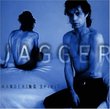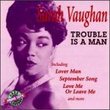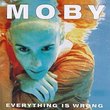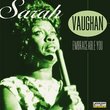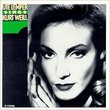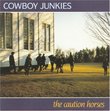| All Artists: Dietrich Fischer-Dieskau, Franz [Vienna] Schubert, Gerald Moore Title: Schubert: Schwanengesang; 4 Lieder Members Wishing: 0 Total Copies: 0 Label: EMI Classics Original Release Date: 1/1/1951 Re-Release Date: 4/10/2001 Album Type: Original recording remastered Genres: Pop, Classical Styles: Vocal Pop, Chamber Music, Historical Periods, Classical (c.1770-1830), Modern, 20th, & 21st Century Number of Discs: 1 SwapaCD Credits: 1 UPCs: 724356755925, 724356755956 |
Search - Dietrich Fischer-Dieskau, Franz [Vienna] Schubert, Gerald Moore :: Schubert: Schwanengesang; 4 Lieder
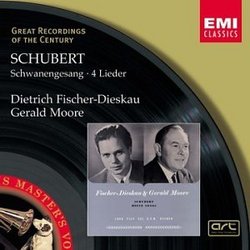 | Dietrich Fischer-Dieskau, Franz [Vienna] Schubert, Gerald Moore Schubert: Schwanengesang; 4 Lieder Genres: Pop, Classical
|
Larger Image |
CD DetailsSimilarly Requested CDs
|
CD ReviewsCROSSING THE BAR DAVID BRYSON | Glossop Derbyshire England | 05/27/2005 (5 out of 5 stars) "Schubert's `Swansong' is not a song-cycle like the mill songs or the Winterreise, it is just his last 14 songs. Brahms said that there was something to be learned from every one of Schubert's 606 solo songs, prompting a slightly flippant remark from Tovey that in some cases one would have to be Brahms to know what it was. How many hundreds of them I myself know (perhaps also how many Tovey really knew) I'm not sure, but there are no blanks in the Schwanengesang. These songs make no pretence of coherence as a group, but Schubert's recurrent theme of love and final separation predominates. His very greatest music was pouring out of him in an unquenchable torrent in his 32nd and last year. He suspected that he did not have long. There are some very deep shadows indeed here, but the special sense of anguish that these songs leave comes not so much from that as from their sheer angelic beauty. I don't believe that they have ever been better done than by Fischer-Dieskau and Moore. In his younger days Fischer-Dieskau was sometimes criticised for excessive emphasis, but I have never agreed. His voice is just too beautiful for that. The best test is the Rellstab Serenade. Do you find the singer too forceful at `Fuerchte, Holde, nicht' or at `Jedes weiche Herz'? I must say I don't. This to me is just natural ardour, the tone still unforced and lyrical, and the rest of the song simply exquisite with a particularly heavenly touch at the little mordants on `In des Mondes Licht' and again later. The melodious beauty makes the solemn tone of Der Atlas all the more effective, and this slow, hushed account of Der Doeppelgaenger, with its tone of near-catatonic horror, surpasses all others I know for the same reason. When it comes to Am Meer the searing expression of grief is given by means of one of the loveliest melodies in the entire set, and the singing here is one of the musical experiences of a lifetime. At other times the composer carries his grief more lightly, and both Abschied and Die Taubenpost have about them that lightness and heavenly innocence that are Schubert's special and most individual gift to music. The thought also crossed my mind, as I listened to Fruehlingssehnsucht, that Schubert had answered a problem that Verdi once raised with a librettist, namely that music can't express the interrogative. Verdi himself coped particularly well when he had no option, at the Quid sum miser tunc dicturus? in his Requiem, but Schubert beat him to it with the five questions in this song. There is more to being a great composer than just a purely musical gift, as Shaw said more than once, and there is more to these songs than just divine melody. However when all's said and done the musical gift is the basis of it all, and Schubert's purely musical endowment was, in my own view, the greatest that any human being ever had. Brahms had a word for it again, in a letter where he asks rhetorically `Does any composer so consistently scale the heights?' As with Mozart, there is a numinous quality to Schubert - we often seem to be in the presence of someone or something using the composer as a mouthpiece, but who or what this agency might have been we are left to wonder. On Schubert's tombstone it says that music has here buried a great treasure and still greater hopes. He would surely have achieved things completely unthinkable if he had lived. There are a few welcome extras here too. Moore was probably not the most proficient technician among accompanists, but his handling of the piano part in the Erlking, in its special way one of the hardest things in the entire literature of the piano, is a thing to remember. In one of his books he explains in detail the various expedients and shifts that he resorted to, but what puts his handling of it in a class of its own for me is first of all the pace he adopts, and secondly the sublime way in which he lets the tension relax without losing speed as he sets the scene for the Erlking's first song. I have heard those fiendish triplets given more evenly, but never quite the sense of drumming hooves conveyed so well, with four good marked beats to the bar and not too fast - the real sense of panic needs to be reserved for the end. Once again Fischer-Dieskau rises above the competition by the sheer sinister, evil beauty of his tone as the Erlking, with no cheap effects - Goethe's Erlking makes pretty speeches and Schubert's Erlking sings pretty tunes with no pantomime cackling. A young composer's swan-song, and a fine monument also to two great performing artists, one of whom happily lives on." Smooth, rather bland interpretation from the young F-D Santa Fe Listener | Santa Fe, NM USA | 01/08/2007 (4 out of 5 stars) "I admire Mr. Bryson's opinions, but he's a bit off on this one. F-D made multiple versions of Schubert's great Schwanengesang, and I'm baffled why EMI calls this a Great Recording of the Century--they have another, better version from him in stereo in their Legends series. It's more mature and sitinctive in every respect than this ealier one in mono from the mid-Fifties.
Mr. Bryson says that the younger F-D was critcized for over-emphasis, but actually this habit cropped up late in his career. Her he is too smooth and bland, if anything. For lieder afficianados, this version sounds like imitation Gerard Husch and his honeyed baritone. When F-D matured, he began to bark and over-dramatize, but at least that was his true self. Personally, I would call his Legends rendition his veyr best and one of the high points in his distinguished career as a Schubert singer." |

 Track Listings (18) - Disc #1
Track Listings (18) - Disc #1